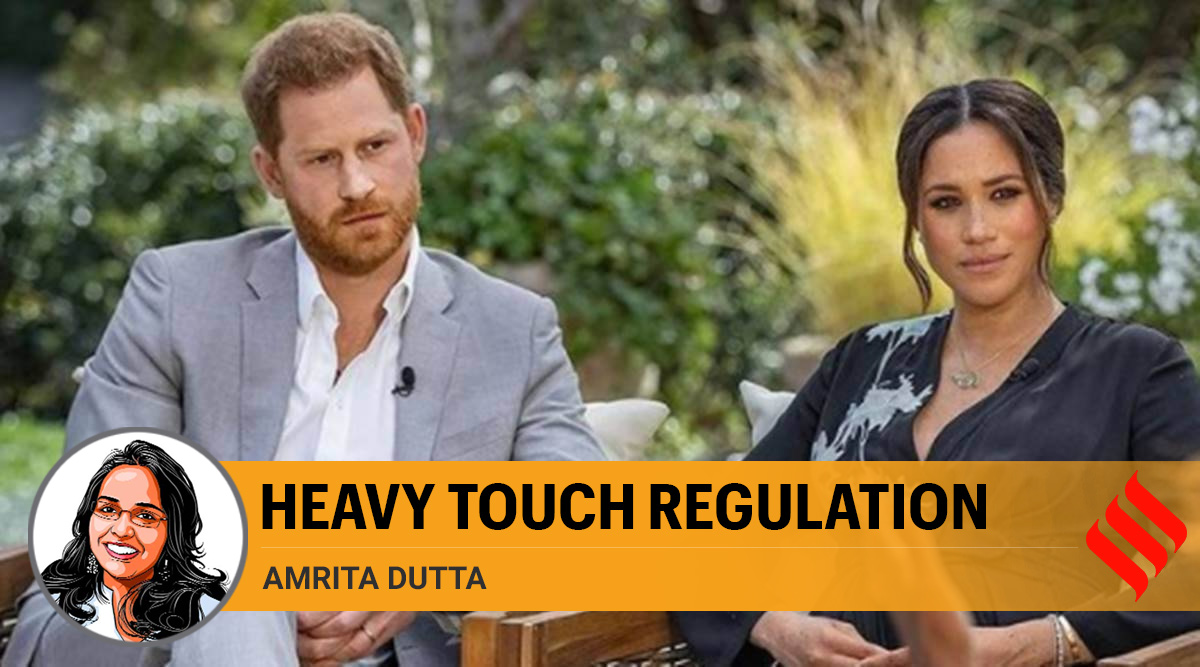The Harry-Meghan interview reveals that not much has changed in the House of Windsor in the 26 years since Princess Diana’s tell-all BBC interview
“All happy families are alike, but each unhappy family is unhappy in its own way,” said a wise Russian, once. But the deluge of desi memes on the British royals would beg to disagree. After the sensational Harry-Meghan tell-all interview with Oprah Winfrey, the members of the House of Windsor have been grafted onto a Kabhi Khushi Kabhie Gham poster. It is the same script: Scion falls in love with a woman with no pedigree, the Family closes ranks and eases both out. Last year, soon after the couple’s decision to embrace the plebeian life, a viral video from Pakistan re-imagined Queen Elizabeth as a Punjabi mother-in-law, lamenting over the Megxit siyappa and the machinations of badnasli bahus. This isn’t the subcontinent adding masala to the bloodless intrigues of its former colonisers’ beloved totems, but an accurate reading. Marriage is the mechanism by which families amass and perpetuate property, as well as notions of caste, race, blue blood. That arch outsider — the daughter-in-law — can’t be allowed to sashay in without so much as a KYC.
Nevertheless, the Harry and Meghan mutiny, with its full HD Hollywood gloss, did pull some punches. The couple blamed the grubby racism, the crushing conformity and the systemic unkindness they faced in the Buckingham Palace on “the firm,” “the institution”, and the “monster machine” — careful to keep the “family” blemish-free. But this one’s harder to swallow than the fiction of monarchy’s relevance. Especially because we have seen this film before.
Twenty-six years separate Princess Diana’s interview to BBC about her “crowded” marriage and son Harry’s revelations to Winfrey. In this period, the monarchy has remained a symbol of white, land-owning privilege, embalmed by arcane rituals, and a code of silence. Some concessions have been made: Royals are no longer forbidden to marry Roman Catholics, and can choose a spouse of any faith, provided the queen approves. The entry of Meghan Markle, not only a commoner, but a divorcee from a biracial family, was seen as an acknowledgement by the crown that it represented a multicultural, multiracial Britain. Going by the couple’s revelations regarding questions about the colour of their child, the progressiveness was only skin deep.
The two interviews are a reminder of how difficult it is for families to grow up — and out of restrictive notions of propriety. The palace, in both accounts, is an emotionally-arid space captive to keeping up appearances — and terrified of having to deal with feelings. Meghan recounts being driven to thoughts of suicide by racist character assassination — but no family member defends her. “This is how it is, we were repeatedly told,” says Harry.
Two decades ago, Princess Diana spoke of not having support through her post-natal depression. “I was the first person ever to be in this family who ever had a depression or was ever openly tearful . . . It gave everybody a wonderful new label — Diana’s unstable and Diana’s mentally unbalanced,” she said. Looking straight into the camera, she admitted to trying to harm herself. “When no one listens to you, or you feel no one’s listening to you, all sorts of things start to happen,” she said. Whether desi or royal, families do find it hard to listen and respond to cries for help even from loved ones, especially when they are hard-wired to uphold social systems at the expense of individual happiness.
The British monarchy is nothing but worship of hierarchy and empire, trussed up in costumes, spectacles and tabloid voyeurism — all of which serve to obscure not just its fundamental lack of purpose but also the frightening dullness of the people who act out its script. Ironically, it comes to life in these moments of crisis, when outsiders within throw it a full-blooded challenge. In the choreographed slickness of this conflict, the Family becomes about inequalities of race and class and the tyranny of the emotionless life. That is to say, just another unhappy family. People like us.
This article first appeared in the print edition on March 11, 2021 under the title ‘Drawing blue blood’.
[email protected]
Source: Read Full Article


